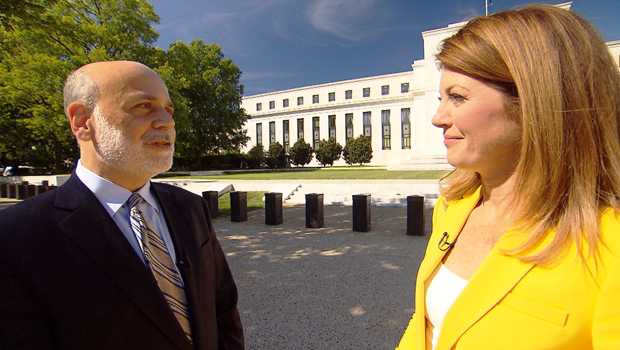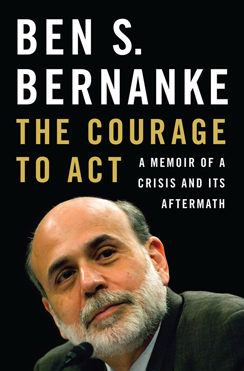Q&A: Ben Bernanke
Whether the Federal Reserve raises interest rates is a question former Fed Chairman Ben Bernanke is glad HE no longer has to answer. But other questions, Bernanke and his wife, Anna, are happy to discuss. Norah O'Donnell of "CBS This Morning" dropped in on them at their home in Washington:
O'Donnell asked Anna Bernanke, "What was your reaction when your husband was offered the Fed chairmanship?"
"I burst into tears -- and they were not tears of joy!" she laughed.
If only she had known what lay ahead.
Just one year after Ben Bernanke became Chairman of the Federal Reserve Board, the economic alarm bells started going off. Now, a year after leaving the Fed behind, Bernanke is putting the crisis into perspective -- HIS perspective.
He described the financial crisis as "the "worst in human history."
Worse than the Depression? "The financial crisis itself, the collapse of asset prices, the near-collapse of so many large financial institutions, in my view, was a worse crisis than even what we saw in 1929, 1930."
The summer of 2008 saw panic across the globe.
"If you look at the major financial firms, most of them either failed or came close to failing or needed some kind of help," he said.
"And it would have taken down the entire economy," said O'Donnell.
"It did!"
The problem was that financial firms were increasingly putting their money into complex investments that many people hardly understood -- many based on risky, sub-prime mortgages. When the housing bubble burst and those mortgages started going under, the firms started to go under, too.
Given the Fed's job to keep the economy stable, it all landed squarely on Bernanke's desk.
"If it was the worst in human history," asked O'Donnell, "why didn't more experts like you see it coming?"
"Well, we didn't. We understood part of it. We saw that there were problems in the housing sector. We saw there were developing problems in sub-prime mortgages. What we didn't see, what I think almost anybody didn't see, was the vulnerability of the financial system to those factors."
- Ben Bernanke's Greatest Challenge ("60 Minutes," 03/12/09)
- Bernanke: "I'm as disgusted as you are" (07/27/09)
Bernanke was never the most obvious person to lead the Fed. He grew up in small-town Dillon, South Carolina, where his father owned a pharmacy started by HIS father. Ben and his younger brother, Seth, who is now a lawyer, often visited their maternal grandparents in nearby Charlotte, "where Grandma cooked all her wonderful specialties," Ben recalled
Young Ben's specialty was numbers. He achieved almost-perfect SAT scores -- 1590 out of 1600, as his brother well-remembers:
"Well, I always feel fortunate that we haven't had areas where we were really competitive -- that would have been bad news for me," Seth said.
Bernanke spent a lot of time on baseball. Not playing it, but tracking the stats. His notebooks, Seth said, "were jam-packed with all the players' names and all their different statistics. I remember looking at those things and saying, 'I just don't see the attraction.'"
When he was 11, Bernanke won the South Carolina State Spelling Bee., which earned him a trip to Washington, D.C.
"I made it to the finals," he recalled. "And the word they asked me was Edelweiss, which is a Swiss flower, which was the name of a song in the movie 'Sound of Music.' Unfortunately, Dillon, my hometown, did not have a theater. I had not seen the movie, so I had never heard of an Edelweiss, and I misspelled the flower. And so I didn't win the National Spelling Bee."
And how do you spell it? "E-D-E-L-W-E-I-S-S," he laughed. " I'll never forget that word!"
Back in Charlotte visiting his grandparents, there was something else he never forgot.
"I used to sit on that porch there with Grandma. She would tell me stories about the Depression. She lived in a town where they had a shoe factory that had shut down. And because there was no jobs, the children of the shoe manufacturers didn't have shoes. And I thought that didn't make any sense at all. And I remember getting interested in, you know, how an economy can get messed up."
As an economics professor at Princeton, Bernanke studied the Depression, concluding that, back then, the Fed didn't do enough. And so with the economy getting "messed up" under Bernanke's watch, he was acutely aware of the potential devastation. He says the problem was that to save Main Street, he had to bail out Wall Street.
"There is still the perception out there that Congress and the Bush White House, and you, bailed out big banks at the expense of little people," said O'Donnell.
"Well, you know, I'm totally sympathetic to that concern," Bernanke said. "And I have to say that when I would go outside and see a bumper sticker which said, 'Where's my bailout?, I really understood that concern. And it was not something we wanted to do.
"But the reason we did it was not because we cared in any way about the banks or their shareholders or even their employees. We cared because we knew that in a massive financial panic, if banks begin to fail in large numbers, as we saw in the Great Depression, the implications for the average guy on Main Street are going to be massive."
The heat came from all sides. Bernanke saw the cartoons, the online satires, and the digs from politicians. Rich Perry referred to the Fed Chairman's efforts as "almost treasonous."
But Bernanke believes firmly that his actions kept the recession from turning into a depression. Now, seven years later, with economic growth and employment up, Bernanke had a ready answer for high school students in Charlotte this month:
"The Fed had to do a lot of unpopular things, and they were necessary, absolutely necessary. And I think history is vindicating them already, in the sense that the financial crisis was stopped and the economy is recovering."
But what about the recovery at the bottom of the ladder?
"The gap between the rich and poor is growing," said O'Donnell. "In fact, there are estimates that income inequality is at its widest since 1928. Why is that?"
"Well, it's a very long-term trend," Bernanke said. "It is not something that just happened last week, it's not something that was caused by the recession. One explanation (not the only one) is that as our society becomes more globalized, more highly technological, that people with lower skill levels are getting left out."
Bernanke believes education is key, and that message is literally brought home in a program started by his wife, Anna. After growing frustrated during a career in education, she founded the Chance Academy to help urban kids who are home-schooled.
The Bernankes are putting their money where their mouths are, financing it pretty much by themselves. "We subsidize just about everybody," Anna said.
These days Benanke -- formerly the most powerful man in the world, some might argue, when it comes to markets -- works primarily at the Brookings Institution, a Washington think tank, advises two hedge funds, and earns a good income making speeches; yet he and Anna have kept the same relatively modest townhouse near Capitol Hill.
"Well, this is the way we like to live, and we enjoy our pleasures. You know, we still do the Sunday crossword puzzle together, and walk the dog."
This month the financial world was watching to see if the Fed would unleash higher interest rates. The glare fell on current Chair Janet Yellen, who decided to maintain the near-zero rates of the Bernanke years.
Ben Bernanke seems perfectly happy to let someone else take the heat.
O'Donnell asked, "Do you miss being Fed Chair?"
"No," he replied. "I really like being able to look in the newspaper, see a story about some kind of problem, and say, 'Gee, I hope somebody does something about that!'"
For more info:
- "The Courage to Act: A Memoir of a Crisis and Its Aftermath" by Ben S. Bernanke (W.W. Norton)
- Ben Bernanke at the Brookings Institution
- Chance Academy, Washington, D.C.

